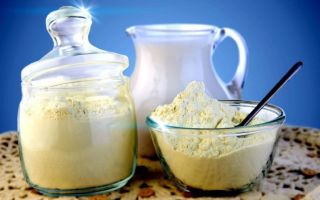Content
- 1 How milk powder is obtained
- 2 Types of milk powder
- 3 Chemical composition and calorie content of milk powder
- 4 The benefits of milk powder for the body
- 5 What is the difference between milk powder and ordinary
- 6 How to properly dilute milk powder
- 7 Can children use milk powder
- 8 Is milk powder good for weight loss?
- 9 Powdered milk for athletes
- 10 Features of the use of powdered milk
- 11 The use of milk powder for cosmetic purposes
- 12 What can be made from powdered milk
- 13 Harm of milk powder and contraindications
- 14 Conclusion
The benefits and harms of milk powder is a controversial issue that interests many. To understand whether a product contains any valuable properties, it is necessary to study its composition and characteristics.
How milk powder is obtained
The raw material for the powder is ordinary pasteurized milk. There are three main methods for producing a dry product.
- Using an evaporator. First, the original milk is concentrated in an evaporator, which makes it possible to remove from it about half of the volume of dry substances - and then the resulting composition is sprayed in a well-heated chamber, where the remaining moisture instantly evaporates. Only a fine and dry milk suspension remains.
- With a drum. Milk is applied to a special drum and heated again, after which only dry powder remains on the surface of the unit.
- By sublimation. In this case, the milk is first frozen at extremely low temperatures, which allows you to get rid of some of the moisture, and then it is heated - while the remaining liquid disappears, and only dry particles remain.
The most useful is milk obtained by freeze-drying or evaporation. The product obtained by heating in a drum often has a specific flavor, as the milk caramelizes slightly during the drying process.

Types of milk powder
In stores, you can find powdered milk with a different percentage of fat. The two main types of product are skim milk with a fat content of no more than 1.5% and whole milk with a fat content of 25%.
The composition and properties remain practically unchanged in any milk powder - only the volumes of the content of certain substances, as well as the calorie content, can change. In addition, skimmed milk powder has a long shelf life.
Chemical composition and calorie content of milk powder
Any milk powder, regardless of the type, contains:
- a significant amount of B-group vitamins - B9, B12, B2 and B1;
- vitamin C;
- vitamins A, E and D;
- choline;
- nicotinic acid PP;
- a large amount of calcium - it is in it that the main benefit of the product lies;
- sodium and phosphorus;
- potassium;
- some magnesium, cobalt, selenium and molybdenum;
- iodine, iron, sulfur and chlorine;
- a complete set of the most important amino acids for the human body.
The calorie content of 100 g of the product depends on its variety. Whole milk contains about 476 calories, skim milk has only 362 calories.
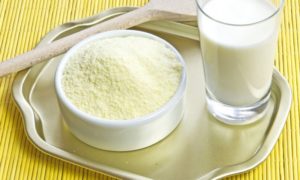
The benefits of milk powder for the body
Powdered milk has properties valuable to the body.The benefit of powdered milk is that it:
- helps to improve blood composition and well-being in case of anemia;
- strengthens teeth, joints, nails and hair, recommended for use in osteoporosis;
- has a beneficial effect on blood vessels and the heart system;
- well absorbed in obesity;
- is a diuretic, therefore, prevents the occurrence of puffiness;
- has a good effect on the nervous system and has a positive effect on the brain;
- benefits with increased acidity of the stomach, since it reduces secretion;
- serves as the prevention of diabetes.
Powdered milk is generally easier to digest than usual, therefore it is a useful product for people with sensitive intestines. but lactose it is also present in milk powder - and if intolerance is associated with an allergy to this component, then the powdered product will still be poorly absorbed.
What is the difference between milk powder and ordinary
Comparing the composition and properties of the two products, it can be argued that the difference between natural and dry milk is minimal. The main differences are as follows:
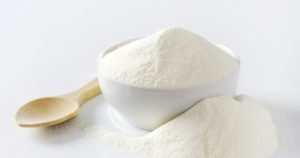
- the percentage of nutrients in milk powder is slightly less, since during high-temperature processing, valuable properties partially disappear;
- dry milk is absorbed faster and easier by the body;
- powdered milk is stored longer - not a few days in the refrigerator, like a regular product, but from six months to 3 years.
There are no negative features in milk powder, and it does not cause harm. The benefits and harms of powdered milk for human health depend only on the quality of a particular product and on the observance of technologies in its manufacture.
How to properly dilute milk powder
The product will delight you with a pleasant, rich taste if you observe the proportions when diluting milk powder and do not forget about the basic rules.
- 1 part of the product accounts for 3 parts of water - this allows you to achieve the desired consistency.
- The product is diluted in warm water with a temperature not exceeding 60 degrees - but in no case in boiling water, otherwise the mixture will curdle. It is also not recommended to use cold water - the particles will not dissolve well.
- The product is not poured with water - on the contrary, it is gradually poured into the prepared liquid, stirring continuously.
- Before using the drink, it is recommended to insist for a quarter of an hour - then the dry mixture will have time to fully give all its useful properties.

Can children use milk powder
High-quality milk powder brings the same benefits to the child's body as ordinary milk. Moreover, a powdered product is even safer - unlike a fresh one, it is unlikely to be expired.
Nevertheless, it is necessary to offer a healthy product to a child no earlier than 8 months - the same as in the case of regular milk. At the same time, you need to choose a low-fat product, and the whole mixture should be introduced into the diet only after 1 year of life - large amounts of fats can be poorly absorbed by the baby's body and cause harm.
Is milk powder good for weight loss?
The product cannot be called dietary - even skim milk contains more than 300 calories per 100 g.
Nevertheless, on a diet, the properties of the product are still beneficial. It does not directly promote weight loss, but saturates the body with important minerals and vitamins, and supports healthy bowel function. The main thing is not to abuse milk powder so that the properties do not harm the figure. The recommended dosage for the diet is 1 glass of drink per day.
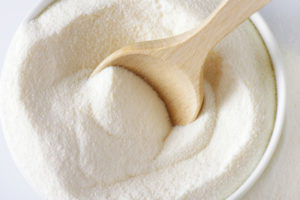
Powdered milk for athletes
The beneficial properties of milk powder are clearly manifested during a sports diet aimed at increasing muscle mass. Whole and fat-free dry mixes are high in protein. Therefore, athletes often use the product instead of or together with special chemical additives.
As a rule, skim milk contains the maximum amount of protein - it will be most useful for those who care about the quality of their muscles.
Features of the use of powdered milk
There are general recommendations for all use of the product. In particular, it is better to drink diluted milk separately from the rest of the food, and no more than 800 ml of a healthy drink should be consumed per day.
But for some diseases and conditions of the body, it is worth knowing the special rules regarding the product.
During pregnancy
During the period of bearing a child, women are allowed to use the product daily. Its benefit is that it contains the most valuable components for the developing fetus - in particular, calcium, which is necessary for healthy bones. But at the same time, it is necessary to monitor the dosages - 2 glasses a day will be enough, otherwise the properties of the product will be harmful and lead to an upset stomach.
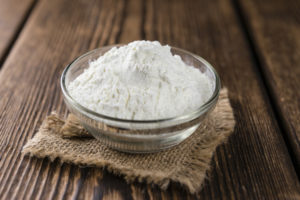
When breastfeeding
In general, during lactation, milk powder belongs to the category of permitted products - it does not contain any harmful substances. However, it is still necessary to introduce the product into the diet after childbirth with caution, carefully observing the child's reaction.
The fact is that sometimes babies absolutely do not like milk powder - because of an allergy to lactose. In this case, both milk powder and a natural product will be harmful.
With gastritis and stomach ulcers
Whether or not to remove milk powder from the diet depends on the type of gastric secretion for ulcers and gastritis. If the acidity is lowered, then the product will have to be abandoned - any milk will be absorbed poorly and will only bring harm.
But with increased acidity, there will be benefits from a whole or low-fat product. The properties will have an enveloping effect on the walls of the stomach, relieve inflammation and irritation and contribute to the normalization of well-being.

With pancreatitis
In the acute phase of pancreatitis, any milk is prohibited. But during the period of recovery or remission, there will be benefits from skimmed milk powder.
It is not recommended to drink dry milk in its pure form, but with its use you can prepare diet cereals, casseroles and omelets. In this case, the mass content of fat in a useful product should be no more than 1.5%.
With diabetes mellitus
Milk for diabetes helps maintain a normal level of calcium reserves in the body, promotes healthy bowel function and prevents complications from developing against the background of the disease. If possible, diabetics are advised to consume fresh natural milk - it has a lower sugar content. However, the dry product is also approved for use - just the daily dosage of a healthy drink should not exceed 500 ml.
With kidney disease
The only contraindication to the use of the product is the presence of phosphate stones in the kidneys. As for other renal ailments, the properties of the product will be beneficial for them - they will serve as a good diuretic and at the same time replenish the supply of important minerals. For kidney disease, it is recommended to consume a fat-free product.

With heartburn
The properties of the diluted product have a soothing effect on mucous membranes and reduce the acidity of the stomach, so milk helps with heartburn. You need to drink a healthy drink in small sips, without rushing - usually a glass is enough to eliminate discomfort.
The use of milk powder for cosmetic purposes
Milk powder is used not only for its intended purpose - the properties of the product are also used in home cosmetology. As a part of medical masks and other products, it has a whitening, cleansing, nourishing effect and helps to carry out complex beauty care.
Teeth whitening with dry milk
The product can be used as a tooth powder - diluted with a small amount of water to a thick paste, applied to a brush and brush your teeth. In this case, you do not need to completely abandon the usual pasta - you can alternate it with milk powder.
Since the concentrated product contains a lot of calcium, the teeth from the powder product quickly become whiter. In addition, the process of calculus formation slows down, the gums become stronger, the teeth become less vulnerable to caries.
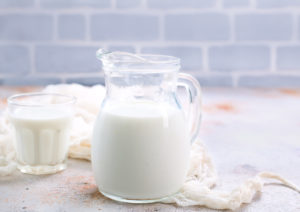
Nourishing mask with honey for facial skin
A mixture of honey and milk powder will help to brighten the skin a little, will have a moisturizing and refreshing effect.
- Half a teaspoon of honey is mixed with 1 chicken yolk.
- Add 1 tablespoon of powder to the mixture.
- The ingredients are mixed, the mask is spread over clean skin.
After a quarter of an hour, the mixture will need to be washed off. Used on a weekly basis, the mask will help improve dry, irritating skin.
Lifting mask to tighten pores
A mask with apple cider vinegar and powdered milk will produce a cleansing and firming effect.
- Milk powder in a volume of 2 large spoons is mixed with 6 drops of apple cider vinegar.
- The mixture is brought to the consistency of thick sour cream.
- The mask is spread over clean skin and kept for about a quarter of an hour.
The benefits of a home remedy will be that the mask will tighten pores, remove fine wrinkles, slightly rejuvenate the skin of the face and serve as a prophylaxis against acne.

Mask for oily hair
The properties of a simple mask made from a fat-free product will have a wonderful effect on the hair. Do it like this - dilute the milk mixture with warm water to a jelly consistency, and then rub it into the hair roots.
You need to hold a useful mask for half an hour, while wrapping your hair with cling film and a warm towel. If done twice a week for 3 months in a row, the hair will become clean, silky and have a healthy shine.
Hair Ends Blend
Useful milk powder in combination with burdock oil and egg yolk will help with brittleness and split ends.
- Whole milk powder in a volume of 8 - 10 large spoons is mixed with a teaspoon of burdock oil.
- 3 chicken yolks are added to the mask.
- The ingredients are mixed well, if the mixture is too thick, add a couple of tablespoons of water.
The finished mask is distributed along the length of the curls and left for half an hour. When applied weekly to the hair, strength and volume are quickly restored.

What can be made from powdered milk
The easiest way to use milk powder is to make a delicious and healthy drink. However, milk powder is used in cooking and for other purposes. Namely, the powder is added:
- in homemade creams, pastes, baking dough;
- pancakes and fritters, cakes and sweets;
- in baby formulas and yoghurts;
- in ice cream;
- in jelly.
The dough prepared with the product becomes denser, and creams, yoghurts and curds can keep their freshness longer when stored in the refrigerator. In addition, healthy milk powder gives various dishes a sweet aroma and an additional pleasant taste.
Harm of milk powder and contraindications
The benefits of a powdery product can be harmful in a number of chronic and acute diseases. It is necessary to refuse the product when:
- allergies to lactose or dry powder intolerance;
- excess calcium in the body;
- the presence of stones of phosphate origin in the kidneys;
- gastritis with a low acidity level.
Milk powder should not be abused - in large quantities, the product can be harmful and cause diarrhea, nausea and pain in the intestines.
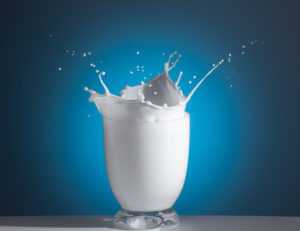
Conclusion
The benefits and harms of milk powder primarily depend on whether you are allergic to lactose. If dairy products are digested normally, then dry powder will not bring any harm to the body.

